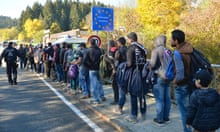“You need to puncture your raft before you arrive, or they’ll send you back.” “If you apply for the relocation programme, they send you to Venezuela.” “In Europe you won’t need money, everything is free.”
These are just three of the many confusing rumours that migrants and refugees might hear. Some of them are downright dangerous, like the one about the raft. Others cause people to make the wrong decisions or take risks.
In response, the Mediterranean Rumour Tracker project has been launched to better inform migrants of the facts. Fieldworkers who speak Arabic or Farsi engage with people in the Greek camps, collect the rumours that are circulating, and then verify or dispel them. This information is posted on a dedicated website and corresponding Facebook pages in English, Arabic, Farsi and Greek.
“With our Facebook pages, we reach about 350,000 people,” says Stijn Aelbers of InterNews, the organisation that has set up the rumour tracker in collaboration with two other NGOs: Translators without Borders and ActionAid. “But we think face-to-face contact is just as important. People like to talk with a real person, they want to be able to ask questions.”
Migrants and refugees are constantly on the move; this means traditional media often don’t reach them. So they get their information from hearsay, from stories that circulate among their group. Aelbers says: “As many of these stories are unfounded or only half true, they run the risk [of taking the] important next steps on the basis of false information.’’
Some rumours arise simply because people misinterpret information they get. “The rumour about Venezuela, which as a South American country cannot be part of the EU-relocation programme, probably stems from a Greek ferry boat called Venizelos,” he adds.

Rumours can also be damaging in other ways. Some may be told not tell the authorities that they are Muslim, leading them to lie during registration procedures, which can cause problems later on. And rumours in refugee camps that some groups are treated better than others, or simply get better food, can lead to conflict and brawls.
The concept of the rumour tracker is not new. InterNews tried it out during the Ebola crisis in Liberia and during the earthquake in Nepal in 2015. “Rumours play an enormous role in every crisis, because people will always fill in the gaps in the information they get,” Aelbers says. “So when a government campaign informs them that Ebola kills, but they see some patients recovering, rumours spring up immediately that these people are ghosts.
“By dispelling rumours you can avoid huge problems. And this is certainly the case during the refugee crisis, where so many people are basing their survival strategies on false rumours. In a way, the refugee crisis is also an information crisis.’’
Shabnam Mortazavi is one of the four volunteers that work as refugee liaison officers for the rumour tracker in the Greek camps. Being of Iranian descent, she is fluent in Farsi, which not only enables her to communicate with Iranians, but also with Afghans, a large group among the migrants. She has recently arrived on the Greek island of Lesbos, where she’s visiting the official and unofficial camps.
“My work starts with simply talking to people,” she says. “I go up to them and ask them how they are and what’s challenging them. I give them useful information and try to build up trust. And then they start to tell me the rumours they’ve heard.”
She writes down everything she hears meticulously. “Rumours are also a good barometer: they tell you what’s going on among migrants,’’ Mortazavi says. “The stories are changing all the time. When the Balkan countries where closing the borders for Afghans in February and March, there were constant rumours that they would be admitted again soon. Right now we hear lots of rumours about family reunification and returning to Turkey.’’
The smugglers also spread these stories about the borders to persuade people to use their services, or to drive up the price. They might also tell migrants that in Europe everything is free, encouraging people to spend all their money on passage.
“They will also say: once you come to Greece, you will be transported to Germany immediately,” says Mortazavi’s Arabic-speaking colleague Nayief Salameh. “I met people who believed this rumour and sold everything they had to come to Greece. They were devastated when they arrived and found themselves stuck in a camp.
“But sometimes we are able to prevent people from falling in the trap,” Salameh continues. “For example, Greek travel agents on the islands spread the rumour that migrants who book a ferry to Athens need to also buy a bus ticket to Macedonia. It was a lie to make more money – once people arrived in Athens, they found out there was no bus. It’s very helpful when you can dispel such rumours.’’
Aelbers believes that the need for the rumour tracker service highlights the failure of larger NGOs to keep migrants informed. “[They] tend to be quite reluctant to provide information. Sometimes that’s good, because the situation changes every day. But it is not always in the best interest of the migrants. Our approach is different. We work with information given by refugees.’’
InterNews’s motto is that communication is aid. “Migrants and refugees often feel cut off from the world,” Aelbers says. “There are not many people who speak their language [so] even fewer people are prepared to listen to them. And they seldom come across someone who says, ‘OK, I am going to find out whether this story you’ve heard is true and give you helpful information’.”
Join our community of development professionals and humanitarians. Follow@GuardianGDP on Twitter.









